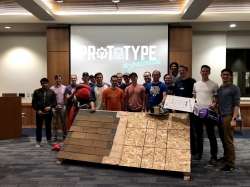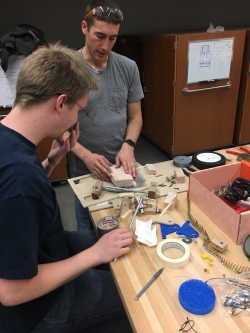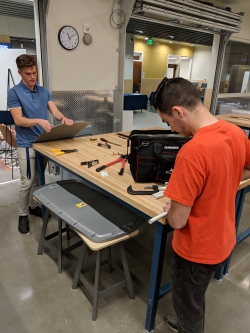BYU Prototyping Event Connects Entrepreneurs and Engineers
PROVO, Utah – Jan 23, 2019 – Six entrepreneurial concepts envisioned by students at BYU were further developed during a thirty-hour rapid prototyping fest known as Prototype-a-palooza—an event created to match entrepreneurs with engineering talent and to help students make meaningful connections with local companies. The event, which was held 9–10 November in the brand-new BYU Engineering Building, was co-hosted by the Ira A. Fulton College of Engineering and the Rollins Center for Entrepreneurship & Technology.
The ideas developed at Prototype-a-palooza were introduced at the Big Idea Pitch, the first competition in the Miller Competition Series—a three-part entrepreneurial competition series that prepares students to launch scalable companies. With the opportunity to work alongside engineers to create prototypes, entrepreneurs better prepared themselves for the next steps in the series.
“The entrepreneurs who participated in Prototype-a-palooza came out with amazing prototypes that will help them validate their ideas,” says Chris Bright, an MBA student who is involved with the Miller Competition Series and assisted in creating Prototype-a-palooza. “These individuals have a leg up on everyone else in the series and a great start to a company. They truly have an opportunity to go far.”
About thirty students participated in the first-time event, which began Friday afternoon and concluded Saturday night. Teams were comprised of the entrepreneur who contributed the idea and up to four students with engineering backgrounds. Eight local sponsors donated prizes for the event, including legal consultation, tech conference tickets, and validation consultation. Senior leaders from the sponsoring companies even attended the final hours of the event to see what students had accomplished.
“The sponsors were extremely willing to help the entrepreneurial community at BYU,” Bright says. “Having eight CEOs in one room at the same time is amazing, especially when they are there on a Saturday night to watch you.”
The only instructions given to teams were to use primitive tools and materials while creating their prototypes. Initial prototypes were made using paper, cardboard, modeling clay, wooden craft sticks, bendy straws, duct tape, and other basic materials. After revising and refining projects, some teams progressed so far along in prototyping that they were allowed to use power tools and stronger materials.
The entrepreneurial ideas worked on during Prototype-a-palooza included an agricultural tech drone, a steamer to clean odd-shaped toys, a robotic roofer, a watchband that doubles as a phone charger, a dictation technology for hearing-impaired individuals, and a sleeping bag with built-in pad and pillow. The success of the projects was evidence of the talent, education, and dedication of BYU students.
“I was absolutely floored by the students’ willingness to go the extra mile and test so many variables,” Bright says. “The application of knowledge and the high-fidelity prototypes were extremely impressive. Every project was first rate. I was amazed by each team—they all came out with impressive prototypes, and there was not a slouch among the group.”
Those efforts were recognized by the various sponsors, which awarded each team with a prize designed specifically to benefit the group’s needs rather than present traditional numerical rankings.
Cameron Stoker, a senior from Mesa, Arizona, studying economics, worked with the dictation technology team, which built a transcription platform for those with learning disabilities. He appreciates how the event provided hands-on learning, efficient prototyping, and valuable networking.
“I enjoyed the camaraderie among those who participated,” Stoker says. “Each team was willing to assist others with projects and ideas, and the sponsors were all supportive of our efforts. The event not only allowed us to make valuable connections but also helped us complete weeks of work in a short span of time.”
In the past, many entrepreneurs participating in the Miller Competition Series had a difficult time creating prototypes due to their lack of technical knowledge. Prototype-a-palooza, which was endorsed by the Rollins Center, bridged that gap by providing students with further opportunities to match creative ideas with mechanical skills.
“Those at the Rollins Center have been extremely supportive of anyone trying to be entrepreneurial minded,” Bright says. “They have done an amazing job making the resources and tools available to all students who want to be involved. If you have the guts and the grit, they will support you all the way. There is no higher praise that I can give to an organization.”
Media Contact: Chad Little (801) 422-1512
Writer: Brendan Gwynn






